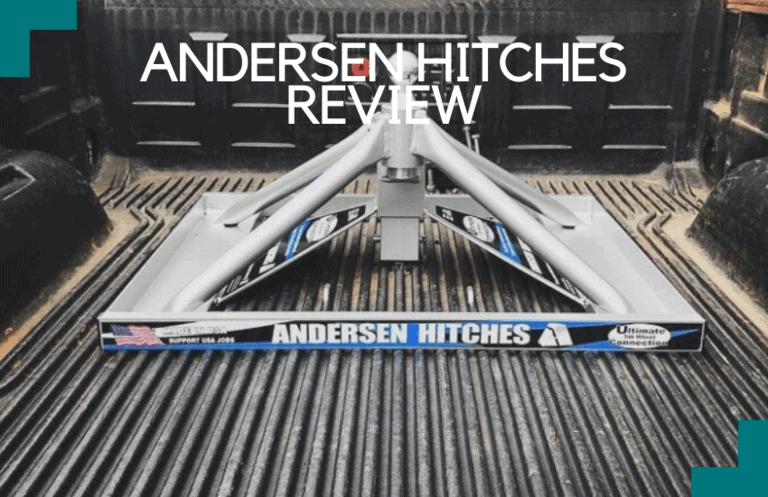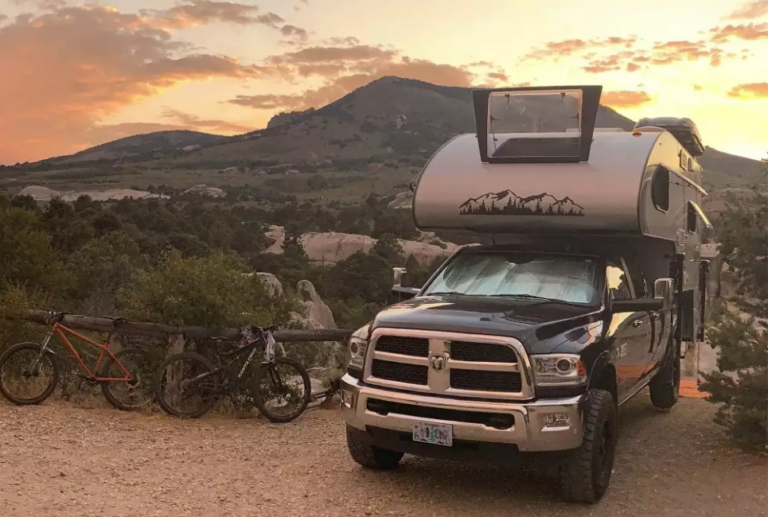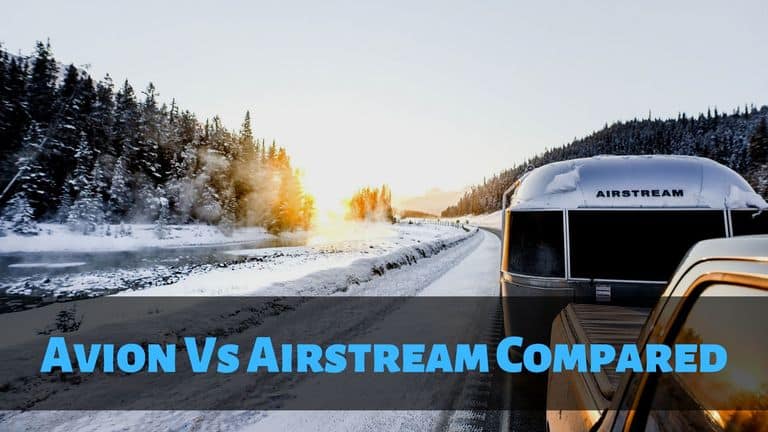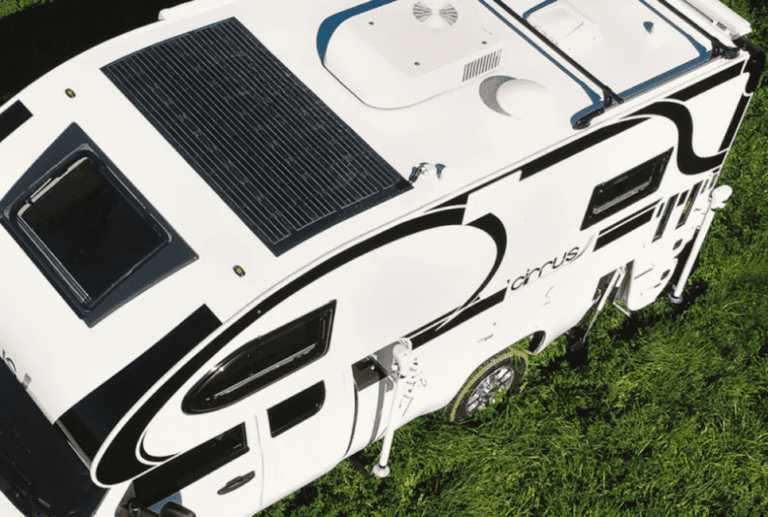Best Boondocking RV Options for Your Next Adventure
- How to Find the Best Small Camping Trailers with Bathrooms - September 15, 2022
- Best Cold Weather RV: Best RVs for Cold Weather RVing - September 14, 2022
- Truck Camper vs Travel Trailer: Which Is The Best For You? - September 14, 2022
Class A’s, class B’s, class C’s, travel trailers, truck campers, fifth-wheels—there are countless options for RVs. Each has its strengths and weaknesses.
We will take a look at six of the best boondocking RV options which can fit nearly any style of RV boondocking. But first, it’s important to know what to look for in an RV for the best boondocking experience.
What is Boondocking?

Boondocking, also known as dry camping, primitive camping, or dispersed camping, is when using your recreational vehicle without hooking up to outside resources such as electric, water, sewage, or cable/internet. Instead, boondockers rely on the onboard resources such as solar panels, generators, fresh water tanks, black and grey water holding tanks, satellites, and LTE-signal boosters.
RV boondocking locations are often free or inexpensive to stay at. They can range from a mountain-view pullout in the heart of Alaska to a quiet corner of a Walmart parking lot. BLM properties are frequently used by RVers since they are open for anyone to use as long as you leave everything how you found it.
Challenges of RV Boondocking
Boondocking is a lot of fun, but it is not without challenges. The longer the trip, the more challenges there are. For example, spending a few months boondocking throughout North America may require you to have the ability to take showers, check your email, run the AC, use the restroom, and have a sufficient supply of drinking water. On the other hand, you may not need internet access, showers, AC, or a large drinking water supply while on a short overnight boondocking trip.
RV Holding Tanks and Boondocking
Most RVs have a freshwater tank, grey water tank, and black water tank. A freshwater tank holds clean water to use for hand washing, flushing the toilet, showering, cooking, and drinking (if you don’t want to bring bottled water). The grey water tank holds the dirty water that comes from the sinks and shower. A black water tank holds toilet waste.
As the fresh water holding tank empties and the grey and black water tanks fill up, you have to find somewhere to dump the waste and fill up. Holding tank sizes vary greatly. Freshwater and grey water holding tanks can range between 10 and 250 gallons. The larger the tanks, the less frequently you have to dump and refill. Also keep in mind that the more people staying in the RV, the quicker the water supply will deplete.
There are many ways to get the most out of each fill-up. Water-saving shower heads can make a huge difference in how long it takes to drain your fresh water holding tank. They reduce the amount of water that flows through without a noticeable difference in water pressure. You can also use the stop-start method to minimize the amount of water that is wasted while washing hands or showering.

Electricity and RV Boondocking
Nearly everything within an RV requires some amount of electricity—microwaves, air conditioners, water pumps, refrigerators, control panels, slide-outs, fans, water heaters, and even gas stoves use electricity to cause a spark. Moreover, if you don’t plan on fully disconnecting from the world, you will need to charge your cell phone, laptop, tablet, and other electronics.
It’s also important to note that the time of year you plan on boondocking can make a big difference in energy consumption. If you have to run the heater or AC 24/7, you will also have to supply the electricity or gas that powers them.
There are several ways you can make sure you have a sufficient amount of electricity when boondocking. Let’s talk about them.
Battery banks
Batteries are essential to boondocking since you won’t be connected to shore power. The more battery power you have, the longer you can go without needing to charge up. You can chain batteries together to increase the amount of watt-hours available.
As you drain your batteries by using your RV’s appliances, you will have to recharge them. There are three ways to charge your batteries: shore power, solar panels, and generators. Since you won’t have access to shore power while boondocking, you will have to work with the latter two options.
It’s important to consider the amount of time you will be able to boondock before needing to recharge the batteries. This will largely determine where and how long you boondock.

Solar panels
While solar panels are not 100% necessary, they will make your life as a boondocker so much easier. Solar panels are a great way to keep your batteries charged up without using up other resources or having to hear a noisy generator.
As long as the sun is shining, you can keep your batteries charged up. The more energy your panels can supply, the less often you will need to run a generator or hook up to an external power source.
It’s important to note that solar power systems are typically not sufficient for the big power-hogging appliances. Your air conditioning, microwave, hairdryer, and big screen TV will often need a more powerful energy source—unless you make expensive customizations to the solar power system.
Generators
As was mentioned, even with solar power, you will likely need another source of electricity. That’s where generators come in. Power-hungry appliances need more power than the average battery bank and solar panel system can supply.
Many RVs come with an onboard generator which can be started from a control panel inside. However, some smaller RVs do not have a built-in generator, so an external one is necessary. There are three types of generators.
- Gas generators
- Diesel generators
- Propane generators

It’s best to go with the option already built into your RV. If the RV does not come with a generator, it’s best to stick with a gas generator since gas is easy to find and often less expensive than other fuel types. A quiet generator like the Onan Quiet Series is a great choice—after all, many boondockers want to get away from the noise.
As you use your battery bank-powered electronics, you will have to start up the RV to charge the batteries (unless you are using solar power). With a single RV battery, you may have to run your generator multiple time during the day to stay charged up. With a large battery bank, you may only need to charge up every few days.
Staying Connected While Boondocking
One of the biggest challenges for boondockers is finding a decent internet connection and a steady cellphone signal. Some modern RVs come equipped with technology to help you stay connected in even the most remote locations. Some of these technologies include:
- Cell signal boosters
- Satellite internet
- LTE hotspot devices
For weekend boondockers, having an internet connection may not be a necessity, but for full-time or part-time boondockers who will be traveling for weeks, months, or years at a time, it is essential. In fact, many RVers make a living online while boondocking.
The Best Boondocking RV Options
Let’s take a look at some of the best RVs for boondocking. There’s an RV in here for everyone—individuals who want to travel alone, couples, and even large families, whether you plan on boondocking on the weekends or embracing the RV life full-time.
Winnebago Revel Class-B RV

The Winnebago Revel opens up a world of possibilities. It’s a compact yet fully self-contained class-B motorhome. This RV is built with outdoor enthusiasts and boondockers in mind.
Its four-wheel drive chassis allows for offroading just about anywhere that RVs are allowed. The Revel has a ton of storage options for such a small space and is perfect traveling with outdoor equipment like kayaks and bicycles.
Pros
- Beautiful and modern design
- Drive and park nearly anywhere with 4×4
- Top of the line technology, features, and capabilities.
Cons
- Only fits 1-2 people
- Pricey
- Needs to resupply water often
Overview
- Comfort: 4/5
- The time between resupply: 3/5
- Maneuverability: 5/5
- Family friendly: 3/5
- Fits in a single parking space? Yes.
- Best for: Traveling through cities and boondocking on moderately rough terrain alone or with a small family.
The Winnebago Revel Class-B RV is $149,299. You can find more about it on their official website.
See how Winnebago compares to Thor here.
The 2019 Lance 650 Truck Camper

This tiny light-weight truck camper comes with everything you need for a weekend boondocking trip. This small camper sleeps up to three people and is equipped with a wet bath.
The Lance 650 is small but tough, which makes it perfect for traveling through back-country roads. There isn’t a better truck camper for the price on the market.
Pros
- It can go anywhere with a 4×4 truck
- Fits in a regular parking space
- Brilliant use of space
- Inexpensive
Cons
- Can feel overcrowded with more than one person
- Smallholding tanks—must resupply often
- Requires a compatible truck.
Overview
- Comfort: 3/5
- The time between resupply: 1/5
- Maneuverability: 5/5
- Family friendly: 2/5
- Fits in a single parking space? Yes.
- Best for: Weekend boondocking alone or with a small family in nearly any terrain.
You can find out more about the Lance 650 Truck Camper on their official website.
The EarthRoamer XV-LTS

The EarthRoamer XV-LTS is possibly the most powerful and advanced RV available on the market. It is highly versatile—you can take it for a cross-country road trip, or a weekend getaway in the most remote areas.
This EarthRoamer has a powerful solar and battery system which will ensure you always have enough electricity. It also comes equipped with massive holding tanks. You name it, the EarthRoamer XV-LTS has it.
Pros
- Drive on nearly any terrain with the powerful 4×4, turbo diesel, Ford F-550 chassis.
- Large holding tanks for more time before needing to resupply
- Huge battery bank and 1320 watts of solar power
Cons
- Too long for a standard parking space
- Pricey
- Only sleeps, 2-4 people
Overview
- Comfort: 5/5
- The time between resupply: 4/5
- Maneuverability: 5/5
- Family friendly: 3/5
- Fits in a single parking space? No.
- Best for: Anything—especially off-roading with a small family
The starting price of the EarthRoamer XV-LTS is $490,000. You can find out more about it on their official website.
Fleetwood Discovery Class A RV
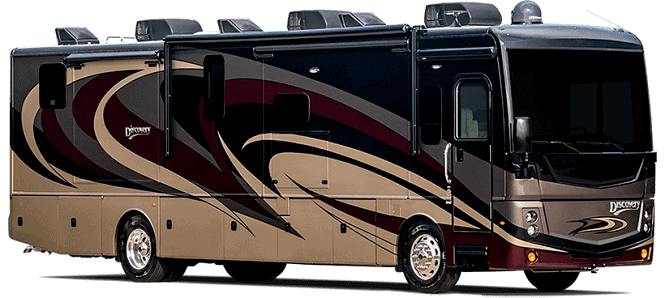
The Fleetwood Discovery is perfect for luxury and long-term family boondocking. While there’s no hope of making a sharp U-turn with this massive 40’ motorhome, it is perfect for setting up for a couple weeks or more at a time.
The Discovery is equipped with huge slide-outs, massive holding tanks, solar power, satellite internet, and even a washer and dryer. This RV can fit 7 people comfortably.
Pros
- Plenty of living space and storage
- Can stay off the grid for weeks without needing to resupply
- Capable of comfortably fitting a large family
Cons
- Difficult to fit in small campsites
- Pricey
- Not rough terrain friendly
Overview
- Comfort: 5/5
- The time between resupply: 5/5
- Maneuverability: 1/5
- Family friendly: 5/5
- Fits in a single parking space? No.
- Best for: Large families who prefer maximum comfort boondocking
You can find out more about the Fleetwood Discovery Class A RV on their official website.
Forest River Flagstaff Micro-Lite Travel Trailer

The Forest River Flagstaff Micro-Lite trailer remains one of the most quality travel trailers available today. The Micro-Lite is available in 17 different floor plans to fit the preference of anyone looking for a solid travel trailer.
The Micro-Lite can range between an ultra-light 3,127 pounds to 5,277 pounds depending on the floorplan. It can sleep up to eight people only being 20-25 feet in length. It also comes equipped with LED lighting to help save on electricity when going off the grid.
Pros
- Sleeps up to 8 people
- Floor plan options for everyone
- Light as a feather
Cons
- Requires a vehicle capable of towing
- Not made for extreme off-roading
- No onboard generator
Overview
- Comfort: 5/5
- The time between resupply: 4/5
- Maneuverability: 2/5
- Family friendly: 5/5
- Fits in a single parking space? No.
- Best for: Families who want to boondock in light to moderately rough terrain.
You can more about the Forest River Flagstaff Micro-Lite Travel Trailer on their official website.
Keystone Montana Fifth Wheel

The Keystone Montana is one of the most popular fifth wheel RVs available today, and for a good reason. This massive RV is designed with luxury travel in mind. Every feature you could dream of for boondocking, the Keystone has it—solar panels, top of the line generator, huge battery bank and holding tanks, and much more.
This RV is made for families—it can comfortably sleep six people. It has a full-size kitchen with a refrigerator big enough for the whole family. You can stay cozy by the fireplace or cook up a burger using the second kitchen outside.
Pros
- Full-size kitchen
- Plenty of living space
- Huge holding tanks
Cons
- Requires a heavy-duty vehicle to tow
- Not easy to maneuver due to its length
- Not made for extremely rough terrain
Overview
- Comfort: 5/5
- The time between resupply: 5/5
- Maneuverability: 1/5
- Family friendly: 5/5
- Fits in a single parking space? No.
- Best for: Large families
You can find more about the Keystone Montana Fifth Wheel on their official website.
| RV | Comfort | Time Between Resupply | Maneuverability | Family Friendly | Ability to handle rough terrain | Fits in Single Parking Space? |
|---|---|---|---|---|---|---|
| Winnebago Revel Class-B RV | 4/5 | 3/5 | 5/5 | 3/5 | 4/5 | Yes |
| Lance 650 Truck Camper | 3/5 | 2/5 | 5/5 | 2/5 | 5/5 | Yes |
| EarthRoamer XV-LTS | 5/5 | 4/5 | 5/5 | 3/5 | 5/5 | No |
| Fletwood Discovery Class A RV | 5/5 | 5/5 | 1/5 | 5/5 | 1/5 | No |
| Forest River Flagstaff Micro-Lite Travel Trailer | 5/5 | 4/5 | 2/5 | 5/5 | 3/5 | No |
| Keystone Montana Fifth Wheel | 5/5 | 5/5 | 1/5 | 5/5 | 2/5 | No |
Final Thoughts
Whether you’re traveling alone or with a companion, whether you want to go off-roading or stick to flat land, whether you want to go for a weekend trip or a year-long boondocking journey, there’s a perfect boondocking RV for everyone. The trick is to know exactly what you want out of your boondocking experience and which RV can provide that experience. Boondocking can be an incredible way to get more in tune with nature, and the right RV will help you do that.




